
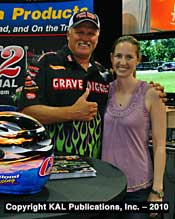
Automotive Aftermarket Industry Week
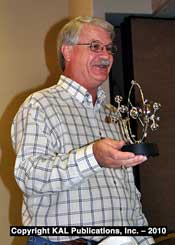
Pacific Oil Conference Board Meeting
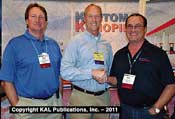
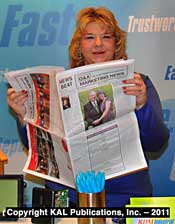
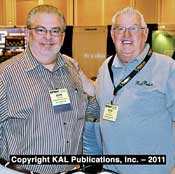
Western Petroleum Marketers Association Convention & Trade Show
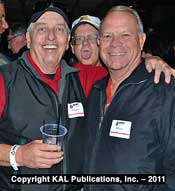
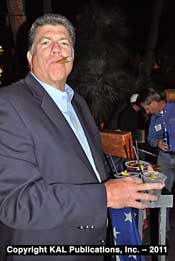
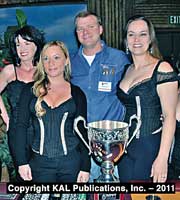
Western Petroleum Poker Tournament
Want to see the photos that didn't make the issue? Check out the Cutting Room Floor.
BP To Sell Assets, Exit Southwest Marketing
Holly Corporation and Frontier Oil to Merge
POC Votes to Reorganize Under CIOMA Management
Fuel Relief Fund Aids Victims in Japan
Kinder Morgan Sued For Contamination
Hawaii Petroleum Marketers Association Joins PMAA
LOS ANGELES, CA. — In a move that will virtually remove BP from marketing in the Southwestern United States, the major oil company has announced that it plans to sell two of its refineries and "associated integrated marketing business" in Southern California, Arizona, and Nevada. The company is estimating it will receive at least $4.4 billion from the sale of the assets.
On the block is the Carson Refinery in Carson, CA., as well as the Texas City Refinery in Texas City, TX. The Carson refinery is located on 630 acres and is one of the largest refineries in California with production of approximately 6.3 million gallons/day of CARB gasoline, 1.7 million gallons/day of jet fuel, and 1.9 million gallons/day of diesel and supplies approximately 25% of the Los Angeles gasoline demand and 50% of the jet fuel to the Los Angeles International Airport.
In addition, the refinery has a 420MW cogeneration facility located on-site, of which BP has 51% ownership, which supplies electricity to the Southern California Edison electrical grid.
The refinery employs approximately 1,200 staff members and 500 contractors.
Beyond the refinery, BP says it will also sell its Southern California crude and product terminals as well as all of its "marketing interests" in the territory of southern California, Arizona, and Nevada.
BP officials say they will divest the ARCO brand as part of the marketing assets but plant to keep brand rights for Northern California, Oregon and Washington. The company also plans to keep the am/pm c-store brand which they plan to license.
Approximately 400 service stations will be affected by BP's decision to leave the Southwest marketplace. The majority of the sites are in the Southern California and approximately half of the stations are dealer-owned and operated.
"We're kind of in limbo right now," George Barseghian, operations manager for Meetra Inc., which owns 12 Arco stations, told local reporters. "We don't know who's going to take over, what our relationship will be with the newcomer and how it will affect our supply. We just don't know what's going to happen and whether their policies will change."
BP officials say they have no buyers lined up to purchase the assets but plan to complete the sales "by the end of 2012."
"The US remains a very important market for BP's fuels, lubricants and petrochemicals businesses and the moves we have announced will give BP a smaller, but well-positioned and very competitive portfolio of refining and marketing businesses," said Iain Conn, BP chief executive refining and marketing, announcing the company's plans. "I have no doubt that the businesses we are seeking to divest will prove extremely attractive to other operators."
With the money raised from the asset sale, BP says they will "focus future downstream investment in the US on further improving and upgrading its other, more advantaged refining and marketing networks in the country," including the company's Cherry Point, WA., refinery. The company noted that the Pacific Northwest territory was "well-integrated with BP's marketing operations and will benefit from advantaged and focused logistics infrastructure."
With the sales of the Texas City and Carson refineries, BP will have cut its refining capacity in the United States by 50%.
The sale of the BP refineries and marketing assets are subject to regulatory and other approvals.
DALLAS, TX. — Holly Corporation and Frontier Oil Corporation have agreed to combine their companies in an all-stock "merger of equals," according to an announcement made by both firms at the end of February.
The new company will be named HollyFrontier Corporation and will be headquartered in Dallas, TX. Mike Jennings, current chairman, president and CEO of Frontier, will serve as president and CEO of the combined company. Matt Clifton, currently Holly chairman and CEO, will serve as executive chairman of the combined company. The board of directors of HollyFrontier will consist of seven current Frontier board members and seven current Holly board members.
HollyFrontier plans to continue to operate in its existing Southwest, Rocky Mountain, and Mid-Continent territory and will have a refining capacity of approximately 440,000 barrels per day from its five refineries.
"Frontier and Holly are two of the most profitable publicly traded independent refining companies; together we will be one of the largest independent refiners in the U.S.," said Clifton and Jennings in a joint statement, announcing the deal, adding that "it provides significant growth potential via a combined company that is better positioned in an increasingly competitive industry. This strategic combination of Holly and Frontier increases our diversity of assets and geographic coverage, provides a strong balance sheet and brings together two of the strongest management teams and most talented employees in the industry."
The value of the combined company is estimated at $7 billion.
The merger is expected to be completed in the third quarter of 2011 following approval of both companies stockholders as well as regulatory agencies.
SACRAMENTO, CA. — The Pacific Oil Conference Board of Directors, by a vote of 11-4, has approved a reorganization of the Pacific Oil Conference. The trade show, which will be celebrating its 52nd anniversary this year, will be restructured under the exclusive leadership of the California Independent Oil Marketers Association.
Making the announcement after the POC Board meeting in late February, the POC officially stated that "The Board, in making this decision, wishes to emphasize this action will have no effect on the operation and presentation of the 2011 POC convention, 'Solving the New Energy Equation — Visualizing Success.'"
The current POC Board of Directors will remain in place until mid-November 2011. Although officials on the Board say they have not developed a new management structure for the Pacific Oil Conference, it is anticipated that the Board of Directors for the California Independent Oil Marketers Association will also serve as the Board for the conference and trade show. It is expected that representatives of Oregon, Washington, Nevada, and Arizona — currently partners in the Pacific Oil Conference — will no longer be a part of the show management.
The Pacific Oil Conference leadership, however, stresses that "the POC will continue to operate as a regional show under this reorganization of management." It is believed the reorganized POC will look for different ways to involve marketers in neighboring states in the conference and trade show.
The 2011 Pacific Oil Conference is scheduled for September 19-22, 2011 in Reno, Nevada.
"The next best thing to food, water and shelter." That sentiment was the founding idea for the Fuel Relief Fund, a non-profit organization founded to help victims immediately following the devastation of a natural disaster. The Fuel Relief Fund has been hard at work in Japan, helping victims of the deadly earthquake and tsunami that struck the nation on March 11.
Shortly after the 8.9 earthquake hit Japan, Ted Honcharik, chairman of the Fuel Relief Fund and CEO of Pacific Tank Lines, Riverside, CA., was making plans to travel to Japan and make fuel available to the survivors of the natural disaster.
"It is unbelievable," stated Honcharik as he arrived in a coastal town, Onagawa, in Japan. "I just do not have the right words to describe the devastation you witness and the emotions that go through you, when you see what these communities have endured and continue to deal with. Driving into town, it looked as though 95 percent of the town was completely destroyed and just gone.
"For anyone who lives near the coast anywhere in the world, imagine that all two-story homes are completely underwater, for at least a mile or two inland. From the roof of those homes you would still need to swim another 20 feet straight up to come close to the surface.
"The problem is that still does not describe it. Add to the height of this tsunami now the incredible force. This force of water is unbelievable, coming at you at a hundred miles per hour. It takes everything in its path with it. Tall solid concrete buildings are no matches for this beast. The buildings are toppled over, completely destroyed, and now lay upside down or sideways a hundred yards from where they once stood."
Honcharik was able to contact city officials and gain their approval for providing free heating oil to the residents who had survived, one of the first organizations to reach the survivors and one who provided something desperately needed: heat in the cold winter weather.
"To me, this disaster is worse than all of these disasters that Fuel Relief Fund has helped in the past, combined," noted Honcharik. "Instead of diesel or gasoline, we soon found out that heating oil could provide the largest positive impact to the people of Japan. Each day now we travel to new and multiple locations between two of the hardest hit cities, Ishinomaki and Onagawa. We keep delivering this heating oil into gas cans that people come running with and we hope that we will not run out before we pump only 2.5 gallons into their can."
The Fuel Relief Fund truck travels to a new location in the area to try and reach the greatest number of victims. The city of Ishinomaki broadcasts the location where the Fuel Relief Fund will deliver every evening, "so now we have many people waiting for hours before we even show up," reported Honcharik, who said that even if it is "cold, windy and rained or snowed for most of the day, still everyone stayed in line patiently," waiting for the fuel to bring home to their family.
The Fuel Relief Fund has now been in Japan for over two weeks, giving away 2,000 to 4,000 liters of heating oil daily. "Every family that has received 10 liters from us has been able to heat a small area of their home for almost a week," said Lidewy Honcharik. "Since many families have moved in together since the disaster struck, we provide around 600 families every day with enough heating oil to warm their home for a week."
All the Fuel Relief Fund workers involved have volunteered their time to help and are relying on donations to keep purchasing heating oil to assist the people in need and are asking for additional donations to help their work in Japan.
For those looking for more information on the Fuel Relief Fund activities or who wish to make an on-line donation, visit the Fund's website at www.fuelrelieffund.org. For an update on the situation in Japan, volunteers in the country are blogging on their activities at fuelrelieffund.wordpress.com/.
LOS ANGELES, CA. — A $30 million lawsuit has been filed against Kinder Morgan over alleged soil contamination at their San Pedro, CA., terminal.
According to the lawsuit, filed in March, the property owned by Younan Safar, Linda Safar and Y & S Enterprises, Inc., was contaminated from activities at the terminal and hydrocarbons and other hazardous materials were "disposed, dumped, spilled, abandoned and/or released into and onto the plaintiffs' real property, contaminating both the soil and groundwater."
Y & S Enterprises operates a large auto body repair facility that controls the exclusive rights to work on high end vehicles for major insurance companies in the South Bay region of Southern California. The company claims that if the soil contamination requires remediation the process will cause the business to be closed and the damages could reach $30 million.
The plaintiffs reported that recent soil sampling collected on January 6, 2011and tested by Leighton Engineering show traces of benzene, toluene, ethylbenzene, and xylenes on their property.
Kinder Morgan officials deny they are responsible for any contamination of the plaintiff's property, "if any such contamination exists" and deny that they are responsible for any damages to the plaintiffs.
As part of the lawsuit, the State of California's Department of Toxic Substance Control has demanded that the Kinder Morgan investigate and characterize the condition of the soil and groundwater at the site. If contamination is discovered, the Department is requiring Kinder Morgan perform environmental remediation of any contaminants in the soil and groundwater.
The terminal site, located at 1313 and 1363 N. Gaffey Street, was first developed in 1943 by Time Oil Company with the installation of a single above-ground storage tank. Public records show that Time Oil used the facility to store gasoline and No. 2 diesel fuel. BP Marine leased the facility from Time Oil in 1977 and purchased it in 1980. By 1980 the facility maintained 11 above ground storage tanks. GATX Terminals Corporation purchased the facility from BP Marine in 1996, and Kinder Morgan Liquids Terminals LLC purchased GATX in 2001.
Kinder Morgan Liquids Terminals LLC operated the facility until October 2004 when the tanks were decommissioned, emptied and cleaned. During their operation, GATX and Kinder Morgan Liquids Terminals LLC stored marine diesel oil, cutter stock, and bunker fuel at the site.
Kinder Morgan Liquids Terminals LLC has sold the site to a developer with plans to build residential housing after the remediation activities have been completed.
The damages case will be reviewed in a jury trial that has been set to commence in October.
WASHINGTON, D.C. — The Petroleum Marketers Association of America reports that the Hawaii Petroleum Marketers Association has voted to become the 48th industry association to join PMAA.
"While we are nearly 5,000 miles from Washington DC, new federal laws and regulations often have equal impact on Hawaii marketers as they do on marketers on M street in Georgetown" said HPMA President Mark Leong. "We value the legislative and regulatory expertise PMAA offers and we want to get more directly involved," he said, announcing the Hawaii Board's decision to join the national association.
"The Hawaii congressional delegation has significant clout in Congress and we welcome having Hawaii marketers helping us get things done on the hill" said PMAA Chairman Sean Cota. "For example, Senator Inouye chairs the powerful Senate Appropriations Committee and we are hoping HPMA members will meet with him in May during the PMAA 'Day On The Hill' and update him on our important issues," he said.
PMAA now has a member association lobbying in every state capitol except for Juneau, Alaska, where the PMAA says a state petroleum marketers association is not known to exist.
Originally published in the April 2011 issue of O&A Marketing News.
Copyright 2011 by KAL Publications Inc.
Serving the 13 Western States, the World's Largest Gasoline, Oil, Fuel, TBA and Automotive Service Market